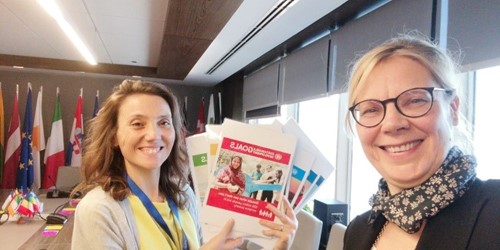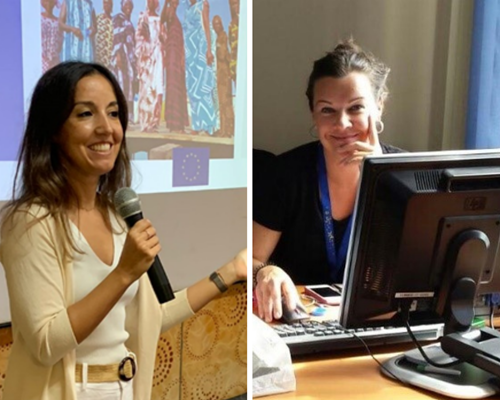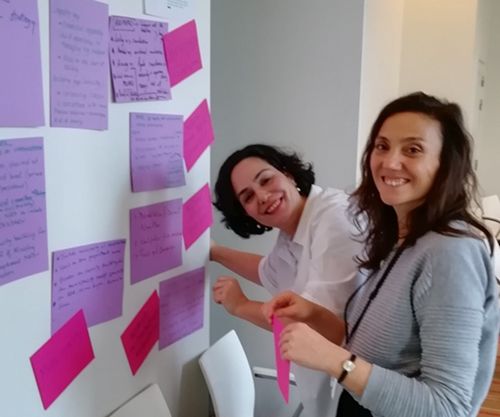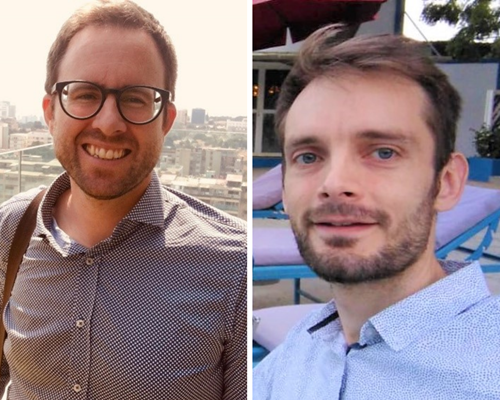News
On our A-game for the human rights-based approach

The Support Facility training team in Brussels during a capacity building session in February 2020
News
The Support Facility training team in Brussels during a capacity building session in February 2020
The NIRAS-managed Support Facility aims to bolster the European Commission in its effort to put human rights and gender at the heart of EU policy
In May 2018, NIRAS started an exciting journey together with the European Commission ‒ to work actively to better understand and implement a human rights-based approach (HRBA) and gender mainstreaming in EU projects, addressing power imbalances and ensuring interventions reach the most marginalized segments of the population. In establishing the so-called Support Facility to the EU and its delegations around the globe, NIRAS brought together a team of seven highly qualified experts, led by Dr Saskia Ravesloot, a senior expert on human rights and gender equality. The team is equipped with specific skills and capacities in human rights, democracy and gender equality and work closely with the European Commission department on International Partnerships, and particularly the unit working with Human Development, Migration, Governance and Peace on a daily basis. Their tasks focus on three main areas: they review action documents describing the EC’s goals and ambitions for their interventions and projects; they provide training and capacity building on how to apply HBRA and tackle gender mainstreaming; and they assist with knowledge management ensuring institutional capacity as well as the capacity of individuals is strengthened.

Team Leader Saskia Ravesloot (R) and Madalena Moita (R)
"Our Support Desk helps the EU's human rights heart pump in the right direction!"
Mark McGinty, Human Rights & Democracy Expert
Implementing a three-pronged approach
Dr Sonia Sanz Ventin coordinates our work reviewing action documents with support from Marjaana Räf. Together with the other team members, they guide the process and provide advice on how to better integrate HBRA and gender mainstreaming into all EC action plans across a variety of countries and sectors. Sonia and Marjaana monitor and assess the review process and report on the improvements made. For example, the advice given on a Blending Proposal in the Agricultural sector in Tanzania, was accepted by the financial institution, improving as such the impact of the intervention on gender equality.
 Sonia (L) and Marjaana (R), Gender & Human Rights Experts
Sonia (L) and Marjaana (R), Gender & Human Rights Experts
Training, the second component of the Support Facility, is coordinated by Dr Sepideh Labani Motlagh with help from Dr Madalena Moita. Our trainings aims to build the HRBA and gender mainstreaming skills of EU staff at headquarters and EU Delegations in partner countries.

Sepideh (L) and Madalena (R), Gender & Human Rights Experts
Dr Saskia Ravesloot coordinates our work on knowledge management with the support of Mark McGinty and Antoine Rerolle. The Facility proudly delivered a HRBA Toolbox, which can be found here. The virtual version includes many resources, tools, exercises and even a quiz to make the application of the HRBA attractive and accessible. For example, it demonstrates how the HRBA’s five working principles ‒ Participation, Accountability, Non-discrimination and Equality, Empowerment and Legality ‒ should be applied. To make the online toolbox as relevant as possible to the Commission’s current work, it also includes information on the key priority areas of the its international partnerships and the user is provided with HRBA essentials for implementing programmes. The tool is primarily directed at EU staff, but the public can also access it.
 Mark (L) a Human Rights & Democracy Expert
Mark (L) a Human Rights & Democracy Expert
and Antoine (R) who specialises in Migration & Human Rights
Spotlight on training and capacity-building
In pre-Covid times, the Facility organised multiple face-to-face trainings for EU Delegations. The team members went on missions to 16 Delegations in Africa (Angola, Burundi, Chad, Ivory Coast, Djibouti, Egypt, Ethiopia, Lebanon, Mali, Senegal, Sierra Leone, Tanzania and Zimbabwe), Asia (Nepal) and Latin America (Guatemala and Haiti). During these visits they trained 460 EU staff members how to apply and use HRBA and implement gender mainstreaming. These trainings generally followed the same structure: a first kick-off management meeting on Monday morning and an awareness-raising session in the afternoon, followed by two days of training on HRBA and gender mainstreaming. The in-person trainings allowed for tailor-made technical support during the two last days of the week. These trainings garnered a lot of positive attention and an added value came from the cross-fertilisation and exchange of experiences and best practices between participants.
On occasion of training missions, the team had the opportunity to organise unique workshops and seminars with other stakeholders. For example in Guatemala, an additional 80 participants were invited to join a unique constructive dialogue with Civil Society Organisations for the integration of HRBA and gender mainstreaming in EU programming in the country. The facility also organised two live events in Brussels on HRBA, gathering more than 100 Gender Focal Points from all-over the globe. Multiple sessions have also been held for EU staff at headquarters in Brussels, for example during a thematic event on infrastructure.
trainings at 16 EU Delegations around the world
During the pandemic, the team prepared and hosted six webinars on COVID-19 from a gender equality and human rights perspective, which 321 people attended.
Given the persistence of the COVID-19 situation, the Facility has not been able to return to the partner countries for further capacity building and training activities. As a result the team members’ creativity has had to shift towards the development of online training sessions. Since March 2020, the trainers have been happy to connect with more than 302 participants over 16 trainings, involving 19 EU Delegations. The Facility is now developing a self-paced course on HRBA to share the message with a larger audience, beyond just EU staff members.
participants learned about COVID-19 from a gender equality and human rights perspective
participants in intensive online training around the EU's Gender Action Plan
Thanks to the success of the online trainings, the Facility was requested to develop a training package to support the implementation of the EU Gender Action Plan (GAP) III (2021-2025): “An ambitious agenda for gender equality and women's empowerment in EU external action". The roll-out of the intensive online training packages targeted various audiences. Gender Focal Points, EU staff and practitioners of EU Member states, were invited to trainings on GAP III, which attracted all together more than 450 participants. Today we have a series of online trainings on GAP III and the key priority areas of the International Partnerships Directorate General. We have trained 482 participants during seven sessions on GAP III and the Green Deal, one of the Commission’s five priority areas. We also organised trainings on GAP III and Digitalisation, Growth and Jobs and Migration for over 125 participants. To complete the training package and meet the needs of different audiences, the Facility also developed several online self-paced courses on GAP III.
The Facility team has really enjoyed the opportunity to develop and conduct trainings in multicultural settings and engage with people from all over the world. COVID-19 has encouraged the team to think outside the box when it comes to delivering training and has made us confident that hybrid capacity building sessions will become the new standard, allowing even larger audiences to participate. The team is excited to meet this challenge head on and eager to explore how new technology and societal shifts will enable more people to explore and understand the importance of HRBA and gender mainstreaming.
“Creating that “aha moment” for your audience, so that they feel empowered, is the ultimate criterium for successful training.”
Dr Saskia Ravesloot, Senior Expert on Human Rights & Gender Equality
